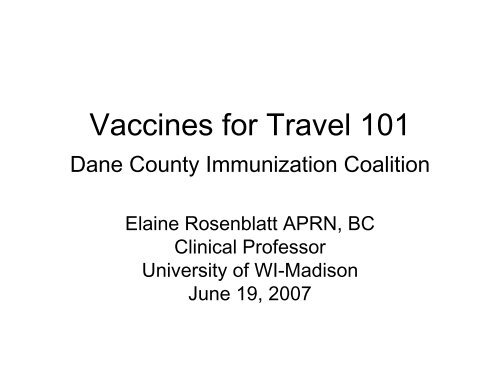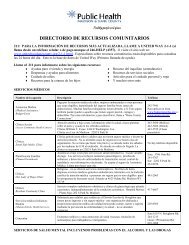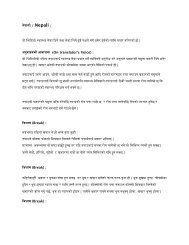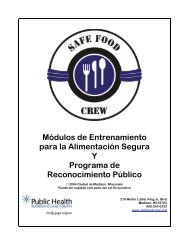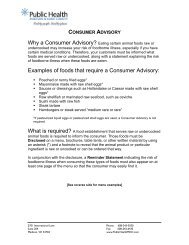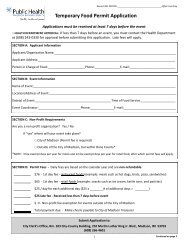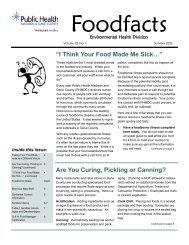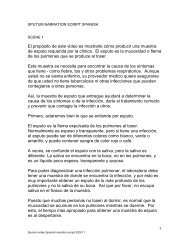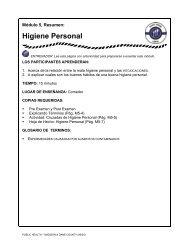Presentation - Public Health - Madison & Dane County
Presentation - Public Health - Madison & Dane County
Presentation - Public Health - Madison & Dane County
- No tags were found...
Create successful ePaper yourself
Turn your PDF publications into a flip-book with our unique Google optimized e-Paper software.
Vaccines for Travel 101<strong>Dane</strong> <strong>County</strong> Immunization CoalitionElaine Rosenblatt APRN, BCClinical ProfessorUniversity of WI-<strong>Madison</strong>June 19, 2007
EMPORIATRICS• Definition: the study of diseases intravelers. From the Greek wordEmporos (one who goes shipboard as apassenger) + iatrics (medicine)• Travel Medicine is an interdisciplinaryspecialty concerned with the preventionand management of health problemsassociated with travel.
QUIZ• What is the most frequent vaccinepreventabledisease among travelersgoing to countries of lower hygienestandards?A. Hepatitis AB. InfluenzaC. MalariaD. Diarrhea
QUIZ• What is the most common clinicalillness in travelers to tropical andsemi-tropical regions?A. DiarrheaB. Hepatitis AC. TyphoidD. Dengue fever
QUIZ• What is the most common cause ofmorbidity and mortality in travelers50 years and older?A. MalariaB. RabiesC. Cardiovascular diseaseD. Accidents
QUIZ• What is the most common cause ofmorbidity and mortality in travelersunder 50 years of age?A. MalariaB. RabiesC. Cardiovascular diseaseD. Accidents
CAUSES OF DEATH WHILETRAVELING• Cardiovascular (heartattack, stroke)• 49%• Accidents (auto,motorcycle)• 22%• Medical illnesses• Infectious diseases• 13.7%• 1.0%
Mainstays Of Pre-travel Medicine• Information, with the goal of behaviormodification: food/beverage, mosquitoes, safetyissues and unprotected sex• Immunizations: required and recommendedvaccines• Chemoprophylaxis: mainly suppressivetherapy against malaria• Self-treatment, especially for travelers’diarrhea• Special precautions/travelers with specialneeds: (e.g., chronic diseases, pregnancy,+HIV)
REQUIRED VACCINATIONS• Yellow Fever (Live)• Meningococcal
Vaccinations For Specific Diseases– Typhoid (Inactivated and Live)– Hepatitis A– Hepatitis B– Meningococcal– Japanese Encephalitis– Rabies– (Plague)
ROUTINE VACCINATIONS– Diphtheria/Tetanus/Pertussis (Td/Tdap)– Pneumovax– Influenza– MMR (Live)– Hemophilus Influenza b (Hib)– Varicella (Live)– Meningococcal– Hepatitis A and B– Polio
Yellow Fever• Required if going to at risk areas and foradministrative purposes (crossing at riskborders)• Administered at official yellow fever centers• Need to have a officially validated WHO yellowbook• Effective 10 days after administration• Duration of immunity: 10 years• No longer needs to be stored in freezer butneeds to be administered within 30 minutesafter carefully drawing it up
Yellow Fever, cont.• Live, attenuated vaccine• .5 ml SQ in arm• Side effects: sore arm, flu-like sx• Wait 30 minutes after vaccination before leavingclinic• Contraindications: pregnancy, +HIV,anaphylactic allergy to eggs, < 9 months of age,history of thymus problems• Use caution with elderly andimmunosuppressed• Use personal protection measures• Carried by a daytime mosquito
Meningococcal Meningitis Vaccine• Highly efficacious and well tolerated. The newconjugated vaccine has longer immunity• Effective 10 days after vaccination• Menomune (MPSV4): polysaccharide: age 2and older• .5 ml SC in arm. Booster dose at 3-5 years• Good for 35 days once reconstituted• Menactra (MCV4): conjugated: preferredvaccine ages 11-55• .5 ml IM in deltoid. Booster not yet determined
Meningococcal Vaccine, cont.• Required for:– Saudi Arabia during the Hajj in March• Recommended for:– international travel to endemic areas (Sub-Sahara Africa)– anyone with a damaged spleen or asplenia– anyone who has terminal complementcomponent deficiency– college students (especially freshmen wholive in dorms)
Hepatitis A• Transmission– Contaminated food and water; Person toperson• Risk– From 1 in 1,000 per week of stay in a touristarea to 5 in 1,000 per week of stay off usualtourist routes
Hepatitis A vaccine• Havrix and Vaqta--both equally effective and areinterchangeable• 1 ml IM preferably given at least 2 weeks beforeat risk• Adult formulation: Havrix and Vaqta age 19 andolder• Shake well before administering• Booster 6 to 12 months later• Side effects: sore arm
Hepatitis B Vaccine forTravelers, Recommend If:• Long-term traveler (>6 months, ?> 3 months)• Frequent short-term traveler• High-risk behaviour profile (sex, drugs)• Occupational exposure: healthcare worker,military, aid worker, missionary• Close contact with locals (e.g., VFR children)• Adventure traveler• Accident prone
Hepatitis B cont.• Schedule– First 2 doses 1 month apart, 3rd dose 5 months after2nd– Accelerated: 0, 7, 21 days or 0, 14,28 days withbooster at 1 year; or 0, 1, 2 months with booster at 1year• Adult dosage (1 ml) begins age 20• Dialysis and immunosuppressed patients requiremore vaccine• Education on preventing risks essential
Twinrix: Hepatitis A&B• Recommended for at risk who are age 18or older• 0, 1, 6 months• Accelerated schedule 0, 7, 21 days with abooster at 1 year, or other schedulessimilar to hepatitis B acceleratedschedules• Became available in 2001
Typhoid• Transmission– Contaminated food and water• Risk– Highest risk for those going off the usualtourist routes and those returning to visitfamily and friends– Rates higher in travelers to Indiansubcontinent, Peru, Northwest Africa(excluding Tunisia), Mexico
Typhoid Vaccine: Live Oral– 1 pill every other day for 4 doses– Duration of protection 5 years– Refrigerate– Side effects: gi, flu-like sx– Avoid if pt HIV+, immunosuppressed, gidisease or children
Typhoid Vaccine, cont.• Killed injectable– .5ml IM– Duration of protection 2 years– Side effects: local reaction, flu-like sx– Takes 2 weeks to obtain immunity• Both vaccines approximately 50-80%effective
Polio Vaccine• Oral (live, Sabin, OPV) vaccine no longerused since January 2000• Use injectable (inactivated, Salk, IPV)• Booster (.5ml) recommended for adults forinternational travel (no polio in theAmericas)• Assess if primary series was done. IPVprimary series: .5ml SQ or IM at 0, 6-8weeks later, 6-12 months after the second
Rabies: Human Diploid CellVaccine (HDCV)• High risk groups should receive pre-exposureseries (veterinarians, animal handlers, trappers,those visiting and living in endemic countries for>30 days, certain lab workers)• Controversy re need for titers. Traditionally highrisk groups get titer drawn every 6-24 monthsdepending on risk. Boosters given if titer
Rabies: Pre-exposure• IM– 1 ml IM day 0, 7, 21 to 28• Still need to avoid contact with animalsand get post-exposure treatment aftercleaning the wound (2 injections day 0, 3)
Rabies: Post-exposure• If the patient didn’t receive pre-exposuretreatment:– Rabies immune globulin (HRIG) 20IU/kg with as much at the injury site asis possible– 1 ml IM day 0, 3, 7, 14, 28
Japanese Encephalitis• Mosquito borne viral encephalitis• If in endemic rural areas for > 30 days– Mostly Asia and India• Still need to use good personal protectionmeasures• 1 ml SQ day 0, 7, 30• Accelerated schedule: 0, 7, 14 or 0, 7, 28
Japanese Encephalitis, cont.• Observe for 30 minutes after• Side effects: can range from local reaction, flulikesx to generalized urticaria, respiratorydistress and anaphylaxis• Need to stay by good health care for 10 daysafter administration• Contraindications: pregnancy, anaphylacticallergy to gelatin• Caution if history of multiple allergies
References• ________ Advice for Travelers. Medical Letter. May2006;4(45):25-34.• __________ Epidemiology and Prevention of Vaccine-Preventable Diseases. 9th Edition: Centers for DiseaseControl and Prevention. <strong>Public</strong> <strong>Health</strong> Foundation, Maryland,2006.• ___________ General Recommendations on Immunization:Recommendations of the Advisory Committee on ImmunizationPractices (ACIP). MMWR December 1, 2006; 55(RR-15).• ____________ Guidelines for Vaccinating Pregnant Women.CDC Sep 2006.• ____________<strong>Health</strong> Information for International Travel.Center for Disease Control; Georgia. 2007-2008.
QUESTIONS“A vaccine notgiven is100%ineffective!”


